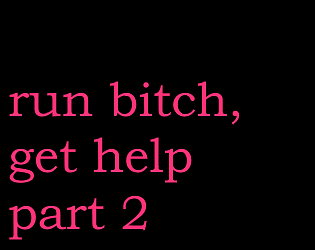Hey! I submitted a game (https://deyaviews.itch.io/a-ball-full-of-dragons) to the jam yesterday an hour before the deadline, but now it's not showing up. I know it's not a finished game, but the submission rules state that that should be fine. Did it get removed? If so, why? If not, could something have gone wrong in the submitting of it?
Deya Views
Creator of
Recent community posts
I'm thinking of making my first SWORDDREAM game both pretty straightforward (you all meet up in a shared dream and you have swords) and meta in a social commentary sense (it's True Genre is "acknowledging negative elements of the past and growing beyond them, and fighting the negative elements that refuse to grow"). Because that's how I saw SWORDDREAM begin and move on from OSR, while still being somewhat intertwined with it.
The first time I heard of SWORDDREAM my brain instantly went "Swords in the Dream, a Forged in the Dark game", and later "Swords & Dreams, a Lasers & Feelings hack". So I will be going with either of these options (unless... both? two games? is that possible? is that allowed?).
I'm thinking of incorporating some collaborative worldbuilding aspects into the mechanics (Building Your Dream), and possibly make it GMless (though I've never made a GMless game, so I'll need to figure out how to). If anyone has resources or tips on how to incorporate such ideas well, I'd be happy with any!
See, I like that sort of thing a lot more! Character death on its own, to me, is usually only desirable if they're either not much of a character, or nothing more interesting in that moment can happen. A character choosing to make a final stand with almost certain death, so that their friends and family can safely escape, or because it's the only thing they can do to uphold their values, that is incredibly interesting (and tragic)!
A character ending up with other great moments of ultimate failure, like the ones you describe, are even better imo! I think those are moments that aren't an "end" per se for a character, unlike death. For me, characters truly end when either boredom hits, or they've overcome their failures and achieved success.
And I don't think "You will die" is a great way to encapsulate that--it strongly implies the opposite. OSR is lethal and therefore adventures should play differently than in a game where challenges are designed to be fair fights! But a game isn't lethal unless characters actually die, I don't think?
I absolutely love Blades in the Dark for that bit of setting-building and reasoning. Partly because the most recent D&D setting I created was set up in a similar way: a walled city surrounded by deadly mists, so play would be contained to the city and players would build on fraught relationships with NPCs and factions over the course of multiple campaigns. Then I discovered Blades and saw all the similarities.
This is very interesting stuff! Those "Ten Commandments" are especially interesting, and I find myself loving bits and disliking other bits of it.
What I love:
1. This is a game about interacting with this world as if it were a place that exists.
2. Killing things is not the goal.
3. There is nothing that is "supposed" to happen.
4. Unknowability and consequence make everything interesting.
5. You play as your character, not as the screenwriter writing your character.
All of these, I feel, are also very much not necessarily opposed to the principles of more story-focused RPGs, which is what I have more experience with and love a lot. This is also how I've GMed a lot of D&D over the years.
Caveat to rule 4 though: surprises for players are great when they open up new paths for interesting scenarios (more challenges or more drama), not when it's a "gotcha!" moment. Traps that just go off without being telegraphed beforehand aren't fun.
What I dislike:
6. It's your job to make your character interesting and to make the game interesting for you.
8. The answer is not on your character sheet.
10. You will die
To me, point 6 means that if a game is not interesting in and of itself, the designer of the game has failed to make a game that can create interesting things. There's of course a difference between "the game, the system" that the designer made and "the game, the campaign" that the players play, and I do agree for the latter meaning in the end it's all up to the players (GM included).
I'm still having trouble with the idea that the OSR only would have rules for direct conflict/combat, when avoiding that is entirely the point of the game. D&D's rules are mostly about combat too, and many other games have a similar framework, but in those games the combat is the point. It feels incredibly counter-intuitive to have a game where the point is to not use the rules.
And lastly, "you will die" gives me the issue that... narratively, death is the least interesting thing that could happen. If a character dies, that's the end for them. There's no further drama, laughs or tragedy to be had. It's on this point that I don't think OSR games should really call themselves role-playing games, if this is their focus. They are very much games, but if cycling through multiple characters that die is the point, and its focused on what players can do rather than what characters can do, all those points together make it feel more like a board game with less rules than a role-playing game.
Ambivalent:
7. If you find yourself in a fair fight, your tactics suck.
9 .Things are swingy.
I do love a "fair fight" sometimes, where it's more dependent on player ingenuity in the moment rather than all their planning up front.
Things being swingy is alright with me in short games, but not longer ongoing ones. Then it starts to feel like the dice matter more, or the GM can just make up whatever and negate my own choices.
Oh cool! Here on itch?
Also, to be clear, by "open table", do you mean that anyone can join/leave whenever they like? Or is it more like a D&D-style "west marches" sort of thing? (I've used "open table" to describe some of my own games, so I want to make sure I wasn't using a different definition from you.)
The first time I tried getting into the OSR, I found some very helpful people willing to explain things to me with patience. This was very nice! But I felt rather out of place, because I was the youngest person in the community (by at least a decade), and it was very mono-gendered. It was a decent place for me to learn a little, but not to play in. It also didn't help that it was almost only people from the USA, so timezones didn't line up at all.
The second time I tried getting into the OSR, I decided to read up on things myself first, so that I wouldn't be going in blind. This time, I instead found a few OSR creators to also espouse political views or having done things in their personal lives that I found very objectionable. I know that's not the case for the OSR movement/community as a whole, but in some of the Discord servers that I joined during this time, I saw others voice support for these creators or their views.
More recently, I've begun to try for a third time, but now just consuming OSR-related media more slowly, by following some creators on YouTube and Twitter. That's been a very good experience so far. I know OSR lives a lot in blogs, but I find blogs on personal websites hard to follow, remember to check, and generally reading long stretches of text online/on PC is a problem for me.
A community's first impression counts for a lot in it looking approachable! A statement on general principles they stand for or against helps separate the good from the bad. Code of Conduct type things need to be very clear and well-enforced. Beyond that, for individual people, just generally being welcoming and kind to all, open to other ways of gaming and how people talk about that, willing to answer questions but also willing to listen--that all helps a lot! I never was able to find those first groups of people I interacted with again, but they were an excellent example. I just felt like outside of games I shared no common ground with them, which makes forming friendships harder.
I have come across some OSR fans that seemed rather anti-other styles of gaming, which turned me off communities that had such vocal proponents, but overall the OSR folx I've talked to just love the DIY feel of a lot of the movement and seem to be accepting of other styles of gaming too. And that is very nice to see.
This would be very handy to have. For some jams, it's clear from their descriptions which kinds of games they accept, but it's not all--and you may have to dig through the description to find it. As someone who makes both video games and tabletop games, I'd find an easy way to split them incredibly helpful.
That is a very nice start, for sure! I'm excited to learn more about the OSR and playing some of its games. I own some (Sharp Swords & Sinister Spells, Knave, Into the Odd), but I haven't gotten a group together for any yet. The OSR community has always intimidated me a little bit, but I feel very good here on Itch.io, so I hope to see this part of the community here to grow too!




